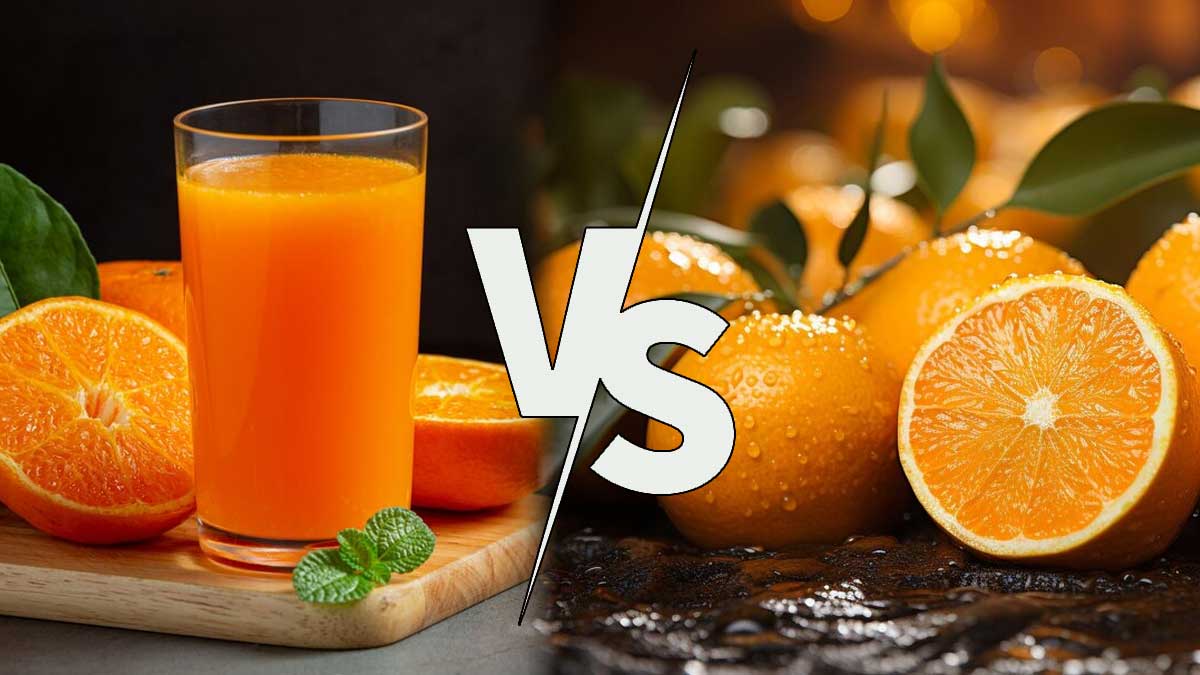
Summer is the time for refreshing beverages, and fruit juices often seem like the perfect choice to beat the heat. However, while fruit juices may seem healthy, they often lack the nutritional benefits of whole fruits and can even have negative health effects. This summer, consider skipping the fruit juice and opting for whole fruits instead for better overall health.
Table of Content:-
Why to Have Whole Fruit Instead of Fruit Juice
1. Higher Sugar Content
One of the main concerns with fruit juice is its high sugar content. When fruits are juiced, their natural sugars are concentrated, leading to a higher sugar content per serving compared to whole fruits. Consuming too much sugar, even from natural sources, can contribute to weight gain, insulin resistance, and an increased risk of type 2 diabetes and heart disease.
2. Lower Fiber Content
Fruit juice lacks the fibre found in whole fruits. Fibre is essential for digestive health, as it helps regulate bowel movements, prevents constipation, and promotes the growth of beneficial gut bacteria. By choosing whole fruits, you'll benefit from the fibre content, which helps you feel fuller for longer and supports overall digestive health.

Also Read: Understanding Brain Blood Clot Symptoms: Expert Shares the Signs and Tips to Seek Prompt Treatment
3. Reduced Nutrient Content
The juicing process can lead to a loss of vitamins, minerals, and antioxidants found in whole fruits. While some nutrients may be retained in fruit juice, the levels are often lower compared to whole fruits. For example, many commercial fruit juices undergo pasteurisation, which can destroy heat-sensitive vitamins like vitamin C. By consuming whole fruits, you'll get a wider range of nutrients that are essential for overall health and well-being.
4. Increased Caloric Intake
Since fruit juice is higher in sugar and lower in fibre compared to whole fruits, it's easier to consume large quantities of calories quickly. This can lead to an increase in overall caloric intake, which may contribute to weight gain and other health issues over time. Whole fruits, on the other hand, are naturally portion-controlled and can help you manage your calorie intake more effectively.

5. Blood Sugar Spikes
Drinking fruit juice can cause rapid spikes in blood sugar levels due to its high sugar content and lack of fibre. This can be particularly problematic for individuals with diabetes or those who are trying to manage their blood sugar levels. Opting for whole fruits, which contain fibre and have a lower glycemic index, can help stabilise blood sugar levels and prevent spikes and crashes.
Also Read: World Asthma Day: What Are the Different Types of Asthma and How Can They Be Treated
6. Dental Health Concerns
The high sugar content in fruit juice can also pose risks to dental health. Consuming sugary beverages can contribute to tooth decay and cavities, especially if proper oral hygiene practices are not followed. Whole fruits, which require chewing, stimulate saliva production and help clean the teeth naturally, reducing the risk of dental issues.
Bottomline
While fruit juice may seem like a convenient and healthy option, it often falls short in terms of nutrition compared to whole fruits. By skipping fruit juice and opting for whole fruits instead, you'll benefit from lower sugar content, higher fibre content, a wider range of nutrients, better blood sugar control, and improved dental health. This summer, make the switch to whole fruits for better overall health and well-being. Whether it's a juicy peach, a refreshing watermelon slice, or a handful of berries, enjoy the deliciousness and nutritional benefits of whole fruits to stay healthy and hydrated all season long.
Also watch this video
How we keep this article up to date:
We work with experts and keep a close eye on the latest in health and wellness. Whenever there is a new research or helpful information, we update our articles with accurate and useful advice.
Current Version